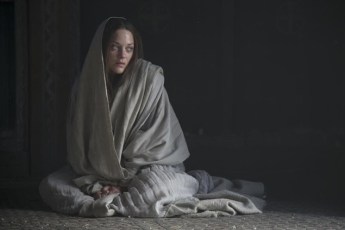Macbeth
In the wake of hundreds of years of literature and arts, classic productions have often been approached from new perspectives, developed and adapted into something different to the original text. This has occurred many a time with previous Shakespeare works – Baz Luhrmann’s Romeo and Juliet of the 90s, Joss Whedon’s Much Ado About Nothing in 2013. But what has been absent for some time is a true authentic cinematic adaptation of his works, which may have been something that was craved by many of his fans. Macbeth marks a towering adaptation of Shakespeare’s first tragedy, bringing the reign of a ruthless and tyrannical leader to life through a blood-splattered, mud drenched lens.
The ever-reliably spectacular Michael Fassbender takes up the titular role of Macbeth, the general of the King of Scotland’s army, who – for those unfamiliar with the play – is given a prophecy by three witches that he will one day be King of Scotland. This sets off Macbeth’s lust for power and dominance, with his wife Lady Macbeth (Marion Cotillard, equally spectacular), driving his lust, aiding his bloody journey to the height of Scotland’s monarchy.
Many screen versions and developments of Shakespeare’s Macbeth have been produced in the past sixty years, but refreshingly this version goes back to the authentic roots of Scotland’s highlands It’s a gorgeous film to behold – Adam Arkapaw’s cinematography of the Scottish scenery is remarkably bleak and crisp, and there’s a cold, sharp aesthetic which fits the tone of the tragedy. The battle scenes are delivered with a gritty, sweat-soaked drive, with everything feeling suitably grim and gory. The final climactic battle, taking place against a backdrop of the roaring crimson flames of a burning forest, is something rather special to be swept up in.
Leading man Michael Fassbender is a casting sensation as Macbeth. Since his rise to fame through one excellent performance after another, his talent has been yearning for a role to sink his teeth into, and it’s absolutely perfect. His intensity of the rage, anguish, guilt and all out power-driven tyrannical insanity is note-perfect, and the famous “Tomorrow, and tomorrow, and tomorrow” soliloquy steals the show. Marion Cotillard equally delivers her soliloquies with confident strength, holding her own against Fassbender’s tour de force, with her confidence being crucial to the development of the character. For an actress with English as a second language, taking on a leading role in a Shakespeare play is considerably challenging, but her execution never puts a foot wrong.
The director’s work is just as commendable as the performances. This is only Justin Kurzel’s second feature film, but he handles the material better than many veteran directors. He understands the importance of authenticity, and exactly where the camera needs to be during the dialogue – right up close to the actors, never looking away, so to capture the best quality of speech deliverance possible. This non-revisionist style comes as refreshing since the last Macbeth on the big screen: Geoffrey Wright’s gothic, urban and thoroughly demonic gang war spin in 2006.
It goes without saying that those unfamiliar with Shakespeare’s style will find the dialogue a bit of a challenge and the story complicated to follow. For the casual viewer this could be problematic: if you are not thoroughly immersed in Shakespeare’s characters there’s a tendency to become detached. This is not a criticism of the film, but an observation of Shakespeare’s writing style.
The film easily marks Michael Fassbender’s finest performance to date, and an excellent showcase for Justin Kurzel’s talent for visual production. This is about as cinematic as Shakespeare gets – beautiful environments, rustic battle scenes, towering performances, and lean, authentic storytelling. Sound the Oscar claxon, we may have a big contender on our hands.






You must be logged in to post a comment.